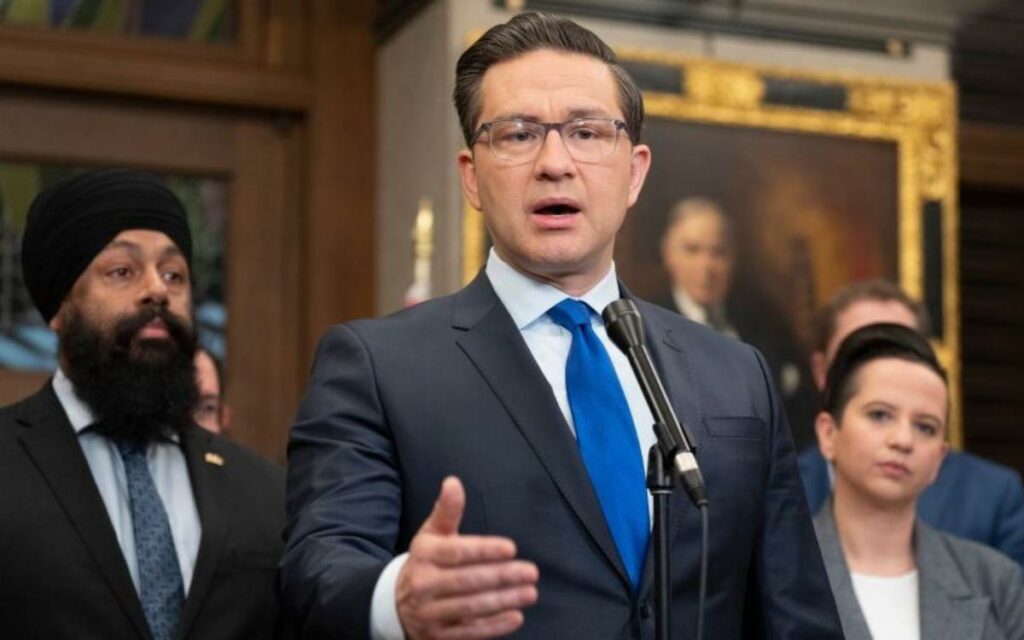
On the heels of another interest rate increase this week, Conservative Party leader Pierre Poilievre (pictured) took aim at the Trudeau government over both the carbon tax and its failure to balance the budget during a cost-of-living crisis. Photo credit: The Canadian Press/Adrian Wyld
It’s been nearly two years since the last federal election took place and returned a Trudeau minority government to power. Thanks to the Liberal-NDP supply and confidence agreement, the Prime Minister continues to govern with the confidence few of his predecessors enjoyed in this particular scenario.
Despite a disastrous session in parliament and crumbling poll numbers for both parties, there are no signs that the NDP plan to withdraw their support from the pact anytime soon. For now, it looks like the terms and timing of the next election will be determined solely at the discretion of the Prime Minister.
Generally speaking, the summer recess is an opportunity for political parties to pause, reset and try and change the channel when their messages are failing to resonate with Canadians. Trudeau and his team will be doing just that, in hopes that getting out of the Ottawa precinct will also put a stop to the endless drip of news related to the Chinese foreign interference scandal.
But to have any hope of winning the next election, the Liberals will need to do more than just put physical distance between themselves and the issue of the day. The challenge here is that many of the policies the Trudeau government has enacted over the course of the last seven and a half years run counter to what Canadians are primarily concerned about: the state of the economy.
In 2015, Trudeau ran on a commitment to finally take climate change seriously after years of perceived neglect by the Harper government. He was propelled to victory and was lauded for his progressive policy platform at the UN climate summit in Paris, France. One year later, he would introduce a national carbon tax. Since then, there has been mounting evidence that the tax has made life more expensive for Canadians while failing thus far to meet the Trudeau government’s self-imposed targets to lower greenhouse gas emissions.
Trudeau also ran on a commitment to double infrastructure spending, and to achieve this, promised to run three years of deficits before returning to balance. The government declared early on in its first mandate that there would be no return to balanced budgets for the foreseeable future, and in this year’s budget said it wouldn’t be on track to reach black until 2027.
On the heels of a rate increase this week, the Conservatives took aim at the Trudeau government over both the carbon tax, and its failure to balance the budget during a cost-of-living crisis. Following an hours-long filibuster, Pierre Poilievre called on the Prime Minister to “cancel this budget.”
“He should also cancel his summer vacation,” added Poilievre. “Conservatives are prepared to work all summer long to rewrite a budget that balances in order to bring down inflation and interest rates, and that cancels all increases in taxes.”
The Conservatives inherently understand that the Liberals are weak on the question of who is best able to manage the Canadian economy, a fact that was all but confirmed by new polling this week. Angus Reid revealed that 41 per cent of Liberal supporters in the 2021 election would not commit to supporting the party again, with economic challenges being a central concern.
Watching the events that have played out this week, from the rate increase to Poilievre’s attack dog stance on the economy, the Prime Minister and his advisors should be concerned. The bigger problem for the government hoping for a summer reset is that in order to work towards a solution for the myriad of economic challenges facing the country, it would mean reversing course on the very policies they implemented.
What’s more likely is Trudeau and his band of MPs spend the summer paying lip service to the problems of their constituents, while scrambling to work out quick fix, band-aid solutions that make for a good headline but lack substance. After all, it’s been the Liberal approach that’s worked for nearly a decade. Why change course now?

Josie Sabatino is a Senior Consultant at Summa Strategies, focused on providing strategic insight and helping clients meet their objectives in an ever changing and complex political and regulatory environment. Prior to joining Summa, Josie spent nearly a decade in political communications and most recently served as the Director of Communications to the Hon. Erin O’Toole, former Leader of the Official Opposition.






